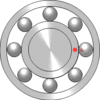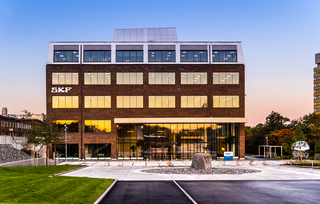
AB SKF is a Swedish bearing and seal manufacturing company founded in Gothenburg, Sweden, in 1907. The company manufactures and supplies bearings, seals, lubrication and lubrication systems, maintenance products, mechatronics products, power transmission products, condition monitoring systems and related services globally.
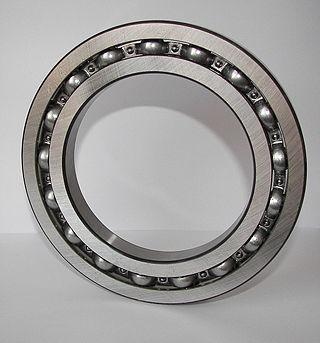
A bearing is a machine element that constrains relative motion to only the desired motion and reduces friction between moving parts. The design of the bearing may, for example, provide for free linear movement of the moving part or for free rotation around a fixed axis; or, it may prevent a motion by controlling the vectors of normal forces that bear on the moving parts. Most bearings facilitate the desired motion by minimizing friction. Bearings are classified broadly according to the type of operation, the motions allowed, or the directions of the loads (forces) applied to the parts.
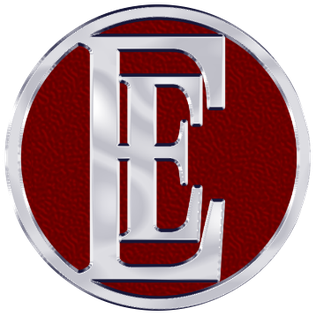
The English Electric Company Limited (EE) was a British industrial manufacturer formed after the armistice ending the fighting of World War I by amalgamating five businesses which, during the war, made munitions, armaments and aeroplanes.

A magnetic bearing is a type of bearing that supports a load using magnetic levitation. Magnetic bearings support moving parts without physical contact. For instance, they are able to levitate a rotating shaft and permit relative motion with very low friction and no mechanical wear. Magnetic bearings support the highest speeds of any kind of bearing and have no maximum relative speed.
Hardy Spicer is a brand of automotive transmission or driveline equipment best known for its mechanical constant velocity universal joint originally manufactured in Britain by Hardy employing patents belonging to US-based Spicer Manufacturing. Hardy and Spicer soon became partners. Later Spicer became Dana Holding Corporation.
HMT Limited, formerly Hindustan Machine Tools Limited, is an Indian state-owned manufacturing company under the control of the Ministry of Heavy Industries, Government of India. It was founded in 1953 as a machine tool manufacturing company, diversifying into watches, tractors, printing machinery, metal forming presses, die casting and plastic processing machinery, and CNC systems and bearings. HMT is headquartered at Bangalore.

Pressed Steel Company Limited was a British car body manufacturing business founded at Cowley near Oxford in 1926 as a joint venture between William Morris, Budd Corporation of Philadelphia USA, which held the controlling interest, and a British / American bank J. Henry Schroder & Co. At that time the company was named The Pressed Steel Company of Great Britain Limited. It acquired Budd's patent rights and processes for use in the United Kingdom. Morris transferred his interest to his company, Morris Motors Limited.

Agricultural & General Engineers Limited (AGE) was a holding company formed on 4 June 1919 during a postwar economic "boom" to combine five British engineering companies: Aveling & Porter, E H Bentall, Blackstone, Richard Garrett and J & F Howard. The holding company's business was described to the judge considering its 1932 winding up as: "agricultural, transport, road, constructional and general engineers".

Hadfields Limited of Hecla and East Hecla Sheffield, Yorkshire was a British manufacturer of special steels in particular manganese alloys and the manufacture of steel castings.
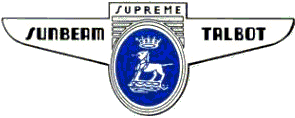
Sunbeam-Talbot Limited was a British motor manufacturing business. It built upmarket sports-saloon versions under the parenthood of Rootes Group cars from 1938 to 1954. Its predecessor Clément-Talbot Limited had made Talbot automobiles from 1902 to 1935.

Ransomes & Rapier was a major British manufacturer of railway equipment and later cranes, from 1869 to 1987. Originally an offshoot of the major engineering company Ransome's it was based at Waterside Works in Ipswich, Suffolk.

The Torrington Company was a firm that developed in Torrington, Connecticut, originally called the Excelsior Needle Company. It was formed in 1866 around the new idea of using a "cold swaging" technique to create better sewing machine needles, but also produced a lot of other things as it got bigger, since the 1950/ focusing mainly on producing bearings, especially needle bearings. In 1980, it was the largest employer in Torrington.
Barden Corporation is a ball bearing manufacturer based in Danbury, Connecticut, USA with factories in Danbury, Winsted, Connecticut and in Plymouth, England. It previously had factories in Bridgeport, Connecticut and Haverhill, Massachusetts.
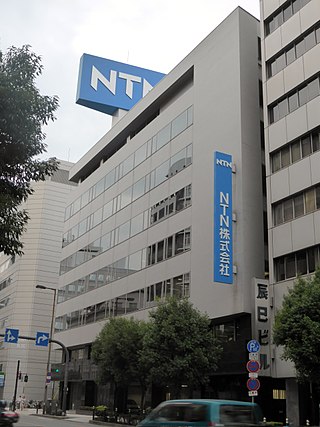
NTN Corporation is one of the most prominent manufacturers of bearings in Japan, second domestically only to NSK Ltd. The company is one of the largest exporters worldwide of friction-reducing products, such as constant-velocity joints.
George Cohen, Sons and Company was a scrap metal merchant with offices in Commercial Road, London. The company was founded by George Henry Cohen (d.1890) as Messrs. George Cohen & Co. in 1834 and changed its name to George Cohen, Sons and Co. in 1883 on the appointment of Michael Cohen, son of the founder. After the First World War the company won a number of large contracts to dispose of surplus munitions including "400,000 tons of high explosives and other shells". The company also engaged in demolition work, with projects including the towers of Crystal Palace, which had survived the great fire, the Dome of Discovery and Skylon at the Festival of Britain, and London's tram system. In 1940 the company moved its head offices to Hammersmith.
Willans & Robinson Limited manufacturing engineers of Thames Ditton, Surrey. Later, from 1896, at Victoria Works, Rugby, Warwickshire, England. They were manufacturers of stationary reciprocating steam engines then steam turbines, diesel motors and generators. They also ran their own foundry.
Peter Hooker Limited owned an engineering business originally established in 1827 and carried on under the name Messrs Peter Hooker as printers' engineers at 12 Pump Row, Old Street Road, St Luke's, later at Pear Tree Court, Farringdon Road, London EC. The limited liability company was formed to own it in 1900. Operations were moved to Black Horse Lane Walthamstow, Essex, in 1901.

Thos. W. Ward Ltd was a Sheffield, Yorkshire, steel, engineering and cement business, which began as coal and coke merchants. It expanded into recycling metal for Sheffield's steel industry, and then the supply and manufacture of machinery.
The Laycock Engineering Company Limited of Archer Road, Millhouses, Sheffield, Yorkshire, England was an engineering business established in 1884 by W S Laycock which made small and major components for railway rolling stock.
Pollard Ball and Roller Bearing Company with its headquarters at Ferrybridge, West Yorkshire was a manufacturer of ball and roller bearings founded by John King. Formerly it had been known as Ferrybridge Industries and was originally a small family motor repair firm, Whitehouse Motor Industries, Ford dealers. Ferrybridge owned Pollard Bearings Limited.




